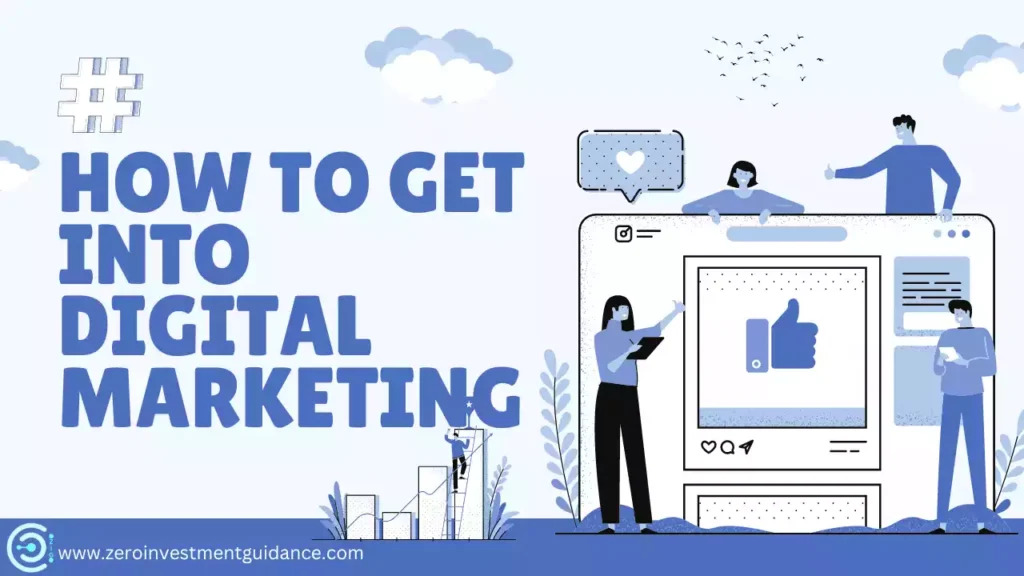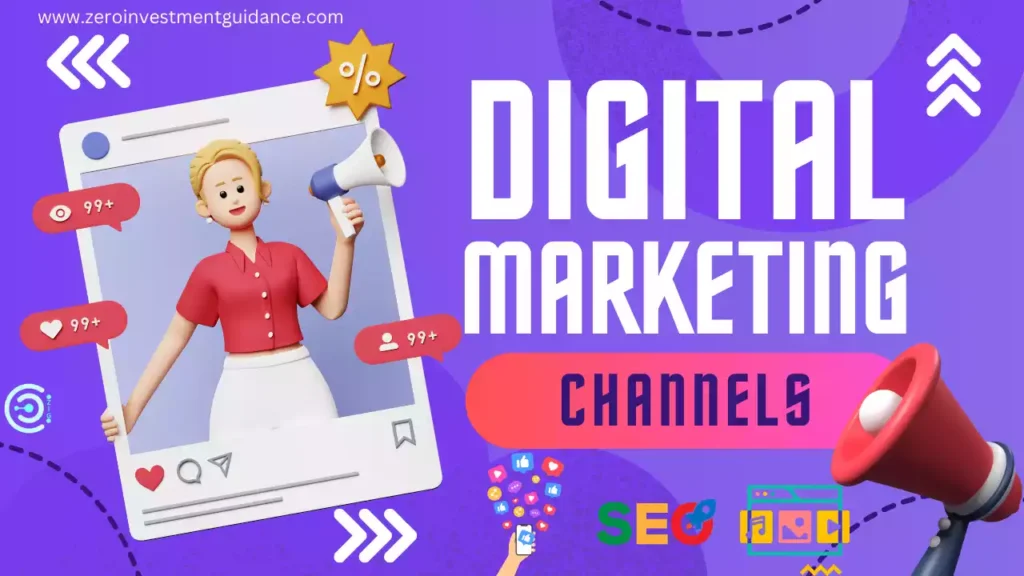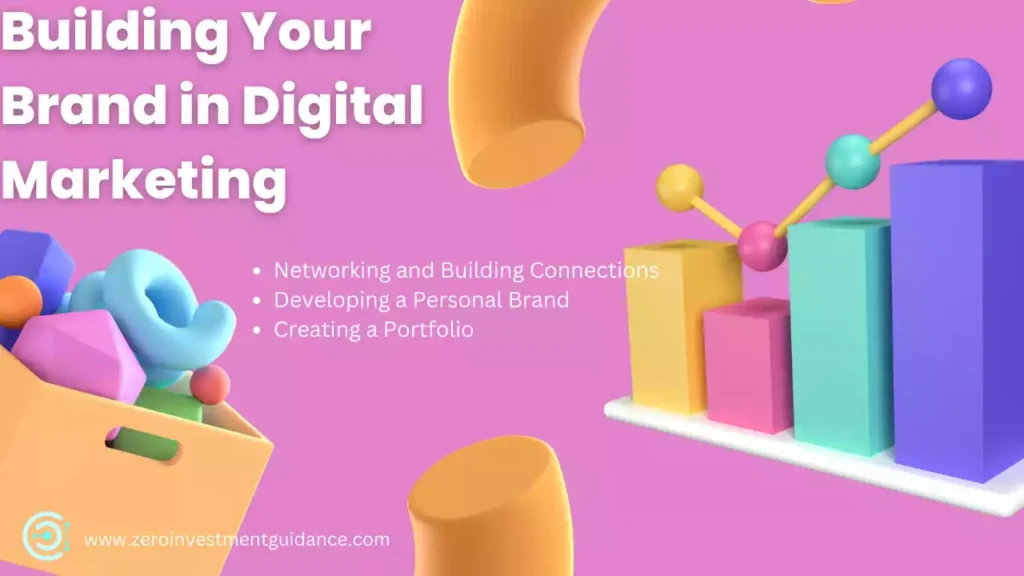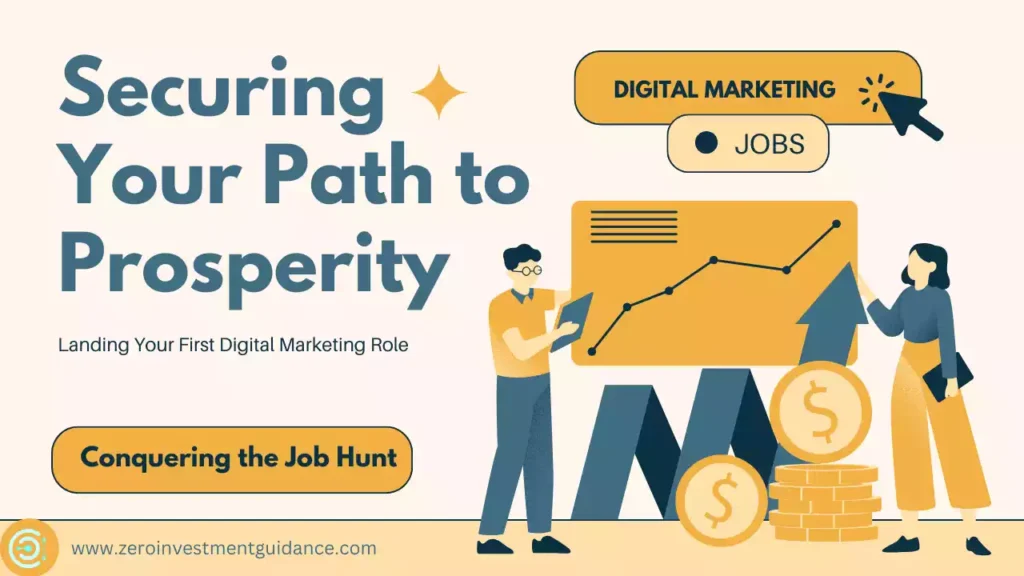Digital marketing has become an essential aspect of business growth in the modern era. With the increasing reliance on digital platforms, companies are constantly seeking skilled professionals who can navigate the digital landscape effectively. Whether you’re a recent graduate looking to kickstart your career or someone considering a career change, getting into digital marketing can open up a world of opportunities. In this comprehensive guide “How to Get into Digital Marketing“, we’ll explore the steps you need to take to embark on a successful journey in digital marketing.

How to Get into Digital Marketing
What is Digital Marketing?
Digital marketing is all about using digital channels to connect with your target audience and promote your products or services. This can include online channels, such as social media and search engines, as well as offline channels, such as digital billboards and TV commercials. Some of the most common digital marketing tactics include social media marketing, search engine optimization (SEO), email marketing, and content marketing.
- Uses digital channels to promote products or services
- Includes online marketing and offline digital marketing
- Examples: social media marketing, search engine optimization (SEO), email marketing, content marketing
Why is Digital Marketing Important?
Digital marketing is important for a number of reasons. It allows you to reach a larger audience than you could through traditional marketing methods. You can target your marketing to the right people, those who are most likely to be interested in your products or services. Digital marketing can be more cost-effective than traditional marketing.
Also, you can track the results of your digital marketing campaigns and see what’s working and what’s not. This allows you to make adjustments to your campaigns and improve your results over time. Digital marketing can help you increase brand awareness and improve customer engagement. Finally, digital marketing can help you generate leads and sales.
- Reach a larger audience
- Target the right people
- Cost-effective
- Measurable results
- Increased brand awareness
- Improved customer engagement
- Generate leads and sales
Understanding Digital Marketing Channels

Now that we’ve explored the basics of digital marketing, let’s delve deeper into some of the most popular channels:
1. Social Media Marketing
Using social media platforms to connect with your audience, promote your brand, and build relationships.
Benefits:
- Reach a large and engaged audience
- Build brand awareness
- Drive traffic to your website
- Generate leads and sales
Increase customer engagement
Examples: Sharing engaging content on Facebook, Twitter, Instagram, etc., running social media ads, collaborating with influencers
2. Search Engine Optimization (SEO)
The process of optimizing your website and content to rank higher in search engine results pages (SERPs) for relevant keywords.
Benefits:
- Increase organic website traffic
- Attract qualified leads
- Improve brand visibility
- Build trust and credibility
Examples: Keyword research, on-page optimization, link building, creating high-quality content
3. Content Marketing
Creating and sharing valuable, relevant, and consistent content to attract and retain a clearly defined audience and ultimately drive profitable customer action.
Benefits:
- Establish yourself as a thought leader
- Educate your target audience
- Generate leads and sales
- Improve brand awareness
- Increase website traffic
Examples: Creating blog posts, infographics, videos, ebooks, case studies
Remember:
- Each channel has its own strengths and weaknesses.
- The best channel for your business will depend on your target audience, your marketing goals, and your budget.
- You can use a combination of channels to create a well-rounded digital marketing strategy.
How to Get into Digital Marketing: A Step-by-Step Guide

The world of digital marketing offers exciting opportunities, and here’s a roadmap to steer you in:
1. Understanding the Basics:
- Grasp the Core Concepts: Familiarize yourself with fundamental digital marketing terms like SEO, PPC (pay-per-click advertising), social media marketing, email marketing, and content marketing. There are numerous free resources online to get you started.
- Explore Different Channels: Learn about the various digital marketing channels and their functionalities. Each channel caters to different goals; understanding them will help you choose the right ones for your future endeavors.
2. Learning from Online Resources:
- Free Online Courses: Take advantage of the abundance of free digital marketing courses available on platforms like Coursera, edX, and Udemy. These courses provide a structured learning experience and introduce you to essential marketing tools and strategies.
- Industry Blogs and Websites: Subscribe to blogs and websites of reputable digital marketing agencies or publications. These resources offer valuable insights, industry trends, and practical tips from marketing professionals.
3. Taking Online Courses:
- Invest in Paid Courses: Consider enrolling in paid online courses from credible platforms or institutions. These courses often go deeper into specific digital marketing areas like SEO optimization or social media advertising, providing a more comprehensive learning experience.
- Choose Reputable Providers: Look for courses from well-established digital marketing institutions or individuals with proven industry experience. Reviews and ratings from past students can also be helpful in making your choice.
4. Gaining Practical Experience:
- Build Your Portfolio: Apply your acquired knowledge by creating a portfolio showcasing your digital marketing skills. This could involve starting a personal blog, managing social media accounts for a local business (with their permission), or creating sample content marketing pieces.
- Freelancing or Internships: Look for freelance opportunities on platforms like Upwork or Fiverr to gain practical experience with real-world projects. Internship programs at digital marketing agencies can also be a valuable way to learn from professionals and build your resume.
- Personal Projects: Take initiative and launch your own digital marketing project. Experiment with different channels and track your results. This hands-on approach will solidify your understanding and provide valuable talking points during job interviews.
Remember, the digital marketing landscape is constantly evolving. Stay updated with the latest trends and tools by continuously learning and exploring. This roadmap equips you with the foundational knowledge and practical steps to kickstart your successful journey into the dynamic world of digital marketing!
Building a Powerful Digital Marketing Skillset: Three Key Pillars

Digital marketing thrives at the intersection of three crucial skillsets: analytical thinking, creativity, and technical know-how. Mastering these areas will equip you to navigate the ever-changing digital landscape and craft impactful marketing campaigns.
1. Analytical Skills: The Power of Data
Data Analysis and Interpretation:
- Be comfortable working with data from website analytics tools like Google Analytics, social media insights dashboards, and marketing automation platforms.
- Learn to interpret data to understand campaign performance, audience behavior, and identify areas for improvement.
Metrics and ROI (Return On Investment):
- Grasp key marketing metrics like website traffic, conversion rates, engagement rates, and cost-per-acquisition (CPA).
- Track and analyze these metrics to measure the success of your campaigns and demonstrate the return on investment (ROI) for your marketing efforts.
2. Creativity: Compelling Content and Captivating Campaigns
Storytelling and Content Creation:
- Develop captivating storytelling skills to craft engaging content that resonates with your target audience.
- Learn how to write compelling website copy, social media posts, email marketing campaigns, and other forms of digital content.
Design Thinking and Innovation:
- Foster a creative mindset to develop innovative marketing strategies and campaigns.
- Stay updated on current marketing trends and experiment with new formats and approaches to capture attention in the digital world.
3. Technical Skills: Tools of the Trade
Marketing Technology (MarTech):
- Familiarize yourself with essential digital marketing tools and platforms used for SEO optimization, social media management, email marketing automation, content creation, and analytics.
Examples include Google Search Console, SEMrush, Hootsuite, Mailchimp, Canva, and Google Analytics.
Basic Coding or Scripting:
- Having a foundational understanding of HTML, CSS, or basic scripting languages like JavaScript can be advantageous.
- This knowledge empowers you to troubleshoot technical issues on your website, optimize content for search engines, and potentially create interactive marketing elements.
Remember:
- You don’t need to be an expert in each area, but a well-rounded understanding of all three is key.
- Focus on developing your strengths while continuously learning and expanding your skillset in the areas you find most challenging.
- Many online courses and resources cater to each of these skillsets, so find what works best for your learning style.
By honing your analytical prowess, unleashing your creativity, and acquiring the necessary technical skills, you’ll be well on your way to becoming a formidable digital marketing professional!
Expanding Your Network and Building Your Brand in Digital Marketing

The digital marketing world thrives on connections and a strong personal brand. Here’s how you can establish yourself and connect with others:
1. Networking and Building Connections
- Industry Events: Attend online and offline industry events, conferences, workshops, and meetups. These events provide excellent opportunities to connect with fellow digital marketers, potential employers, and industry influencers.
- Social Media Engagement: Actively participate in relevant online communities and social media groups. Share valuable insights, engage in discussions, and connect with other professionals on platforms like LinkedIn, Twitter, and industry-specific forums.
- Collaboration: Seek out opportunities to collaborate with other digital marketers on projects, content creation, or even guest blogging opportunities. This expands your network, strengthens your skills through collaboration, and allows you to showcase your expertise to a wider audience.
2. Developing a Personal Brand
- Craft Your Online Presence: Create a professional website or online portfolio showcasing your skills, experience, and achievements. Optimize your LinkedIn profile with relevant keywords and tailor it to highlight your digital marketing expertise.
- Content Creation: Publish insightful content related to digital marketing on your website or social media platforms. Share your knowledge, industry trends, and personal experiences to establish yourself as a thought leader and attract potential clients or employers.
- Thought Leadership: Consistently share your expertise by participating in online discussions, forums, or even starting your own blog or podcast.
3. Creating a Portfolio
- Showcase Your Skills: Build a portfolio that demonstrates your digital marketing abilities. This could include samples of your content writing, social media campaigns you’ve managed, or case studies highlighting successful projects you’ve been involved in.
- Personal Projects: If you haven’t had the opportunity to work on real-world projects yet, consider creating your own personal projects to showcase your skills. This could involve starting a blog, managing social media for a local non-profit organization (with their permission), or developing a content marketing strategy for a hypothetical brand.
- Quantify Your Achievements: Whenever possible, quantify the results of your work in your portfolio. For example, if you managed a social media campaign, showcase the increase in followers or engagement metrics.
By actively networking, cultivating a strong personal brand, and building a compelling portfolio, you’ll position yourself for success in the dynamic world of digital marketing.
Conquering the Job Hunt: Landing Your First Digital Marketing Role

The exciting world of digital marketing awaits! Here’s a roadmap to navigate the application process and ace your interview:
1. Applying for Digital Marketing Jobs
- Targeted Job Search: Focus your job search on digital marketing roles that align with your skills and interests. Utilize job boards like Indeed, LinkedIn, and industry-specific platforms.
- Crafting a Stellar Resume: Tailor your resume to each job application, highlighting relevant skills and experiences that directly address the requirements mentioned in the job description.
- Cover Letter Magic: Don’t underestimate the power of a cover letter! Craft a personalized cover letter showcasing your enthusiasm for the specific role and company. Briefly demonstrate your understanding of their brand and how your skills can benefit them.
2. Interview Preparation Tips
- Research the Company: Thoroughly research the company you’re interviewing with. Understand their brand, target audience, and recent marketing initiatives. This demonstrates your genuine interest and preparedness.
- Practice Makes Perfect: Practice your interview responses beforehand. Anticipate common digital marketing interview questions and prepare clear, concise answers that highlight your skills and experiences.
- Prepare Your Questions: Having well-thought-out questions for the interviewer demonstrates your curiosity and initiative. Ask questions about the role, the team culture, and the company’s digital marketing goals.
3. Landing Your First Digital Marketing Job
- Confidence is Key: Project confidence and enthusiasm during your interview. Highlight your transferable skills and showcase your passion for digital marketing.
- Follow Up: After the interview, send a thank-you email to the interviewer reiterating your interest in the position and your qualifications.
- Negotiate Your Offer: If offered the job, be prepared to negotiate your salary and benefits package. Research average salaries for similar roles in your location to ensure you’re being fairly compensated.
Bonus Tip: Utilize online resources and communities dedicated to digital marketing jobs. These platforms offer valuable interview tips, salary negotiation advice, and resume-building guidance specific to the digital marketing field.
Remember, the job search is a journey. Stay persistent, highlight your unique value proposition, and showcase your passion for digital marketing. With dedication and these helpful pointers, you’ll be well on your way to landing your dream digital marketing role!
Staying Ahead of the Curve: Continued Learning and Overcoming Challenges in Digital Marketing
The digital marketing landscape is constantly evolving. To stay relevant and thrive in this dynamic field, continuous learning and the ability to overcome challenges are crucial. Here’s how you can excel:
Continuing Education and Growth:
- Embrace Lifelong Learning: Digital marketing is a field that demands ongoing learning. Dedicate time to stay updated on the latest trends, algorithm changes, and emerging technologies.
- Online Resources: There’s a wealth of online resources available, such as industry blogs, podcasts, webinars, and online courses offered by platforms like Coursera, Udemy, and LinkedIn Learning. Take advantage of these resources to expand your knowledge and refine your skills.
- Industry Events and Conferences: Attending industry events, conferences, and workshops allows you to connect with other professionals, learn from industry leaders, and discover the latest advancements in the field.
- Certifications: Consider pursuing industry-recognized certifications in specific areas like SEO, social media marketing, or content marketing. These certifications validate your expertise and enhance your resume.
Overcoming Challenges in Digital Marketing:
- Staying Focused with Evolving Algorithms: Social media platforms and search engines constantly update their algorithms. Stay updated on these changes and adapt your strategies accordingly to ensure your content remains discoverable.
- Content Creation in a Saturated Market: Standing out with your content in a crowded digital space can be challenging. Focus on creating high-quality, valuable, and engaging content that resonates with your target audience.
- Data Overload and Analytics Paralysis: The abundance of data available in digital marketing can be overwhelming. Learn to prioritize key metrics, leverage data visualization tools, and focus on actionable insights to optimize your campaigns.
- Keeping Up With the Pace of Change: The digital marketing landscape changes rapidly. Embrace a growth mindset, be adaptable, and continuously experiment with new approaches to stay ahead of the curve.
Remember:
- Surround yourself with a network of other digital marketing professionals. Share best practices, bounce ideas off each other, and learn from each other’s experiences.
- Don’t be afraid to experiment and take calculated risks. The most successful digital marketing campaigns often involve a bit of creativity and innovation.
- Track your results and measure the success of your campaigns. This data will guide you in making informed decisions and optimizing your strategies for better performance.
By continuously learning, embracing challenges, and staying adaptable, you’ll establish yourself as a valuable asset in the ever-evolving world of digital marketing.
Conclusion
The digital marketing landscape offers a treasure trove of opportunities for those who are passionate, curious, and eager to learn. This journey equips you with the skills to connect with audiences, build brands, and achieve marketing goals in the ever-expanding digital world.
As you embark on this exciting path “How to Get into Digital Marketing”, remember the key takeaways:
- Master the Fundamentals: Grasp core concepts, explore different channels, and understand how they work together.
- Sharpen Your Skillset: Develop analytical prowess, unleash your creativity, and acquire the necessary technical skills.
- Build Your Brand: Network strategically, cultivate your online presence, and showcase your expertise through a compelling portfolio.
- Embrace Continuous Learning: Stay updated on trends, explore new resources, and adapt to the ever-changing digital landscape.
- Welcome the Challenges: Embrace the dynamic nature of digital marketing, and view obstacles as opportunities to learn and grow.
The digital marketing world is brimming with possibilities. With dedication, a thirst for knowledge, and these valuable insights, you’re well-positioned to carve your niche and make a significant impact in this dynamic and ever-evolving field.
So, are you ready to dive into the exciting world of digital marketing?
FAQs
Q: Do I need a specific degree to pursue a career in digital marketing?
A: While having a degree in marketing or a related field can be beneficial, it’s not always necessary. What matters most is gaining practical experience, developing relevant skills, and demonstrating your passion for digital marketing.
Q: How can I gain practical experience in digital marketing?
A: You can gain practical experience by working on real-world projects, volunteering for non-profit organizations, interning at digital marketing agencies, or offering your services to local businesses. Building a portfolio showcasing your work is crucial for demonstrating your skills to potential employers or clients.
Q: What are some essential skills for a career in digital marketing?
A: Essential skills for a career in digital marketing include analytical skills for interpreting data and tracking campaign performance, creativity for developing compelling content and campaigns, technical skills for using digital marketing tools and platforms, and communication skills for effectively conveying messages to the target audience.
Q: How do I stay updated on the latest trends and developments in digital marketing?
A: Stay updated by following industry blogs, attending webinars and conferences, joining online communities, and participating in workshops and training programs. Networking with professionals in the field and continuously seeking new learning opportunities will help you stay ahead in the rapidly evolving world of digital marketing.
Q: What are some common entry-level positions in digital marketing?
A: Common entry-level positions in digital marketing include digital marketing assistant, social media coordinator, content writer, SEO specialist, email marketing associate, and digital advertising intern. These roles offer opportunities to gain hands-on experience and learn foundational skills necessary for advancing your career in digital marketing.